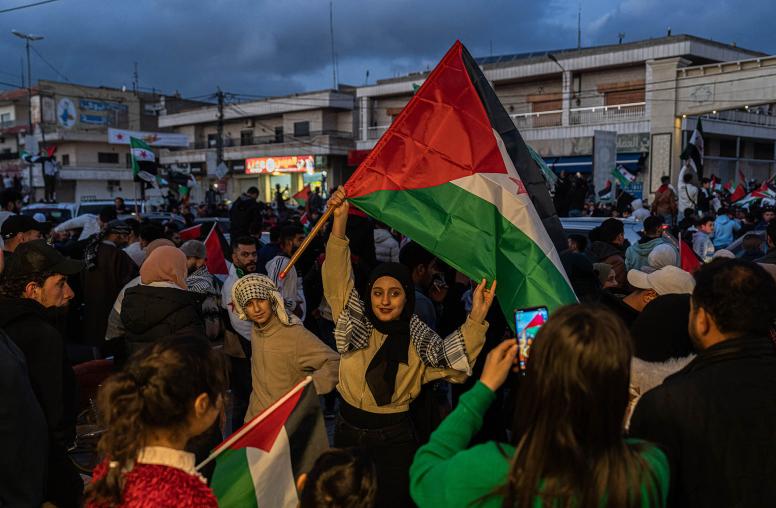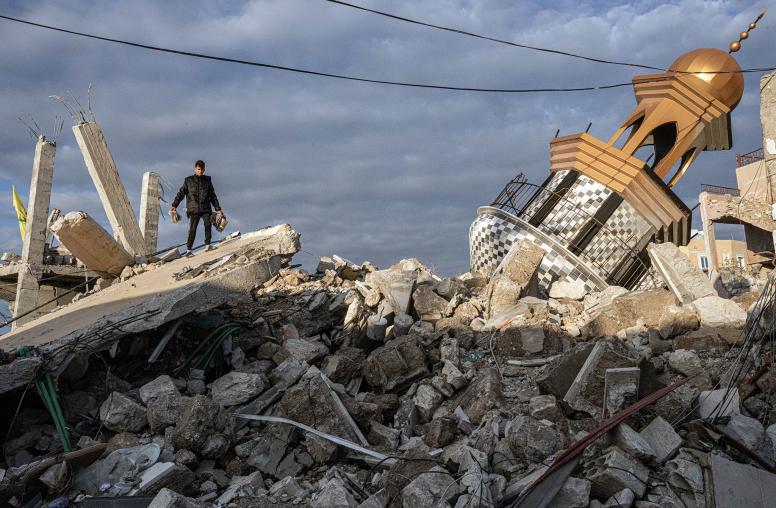Lebanon's Unraveling Could Upend the Region and U.S. Interests
But it's not too late for Washington to help forestall Beirut’s impending collapse.
While Americans are understandably preoccupied with multiple crises at home, a catastrophe is looming in Lebanon with significant implications for the United States. Roiled by a major debt crisis that has been compounded by the COVID-19 pandemic and economic lockdown measures, Lebanon is rapidly spiraling toward the worst-case scenario: a failed state on the eastern Mediterranean.

An Economy in Freefall
Increasingly, Lebanon is being compared to Venezuela, another basket case marked by political instability and economic collapse. Yet, Lebanon’s fundamentals are even worse than those of Venezuela, whose oil resources ultimately could fund its recovery. Lebanon’s greatest resource is its human capital —a dynamic, entrepreneurial population that is bearing the brunt of the crisis.
The statistics are staggering: The Lebanese lira has lost 80 percent of its value since October 2019, fueling hyperinflation now estimated at 55 percent, with some food items witnessing nearly 200 percent price increases. Hunger, and even famine, are real concerns. Half the country lives below the poverty line and the number is expected to climb as Lebanon’s middle class sees its savings evaporate. Unemployment is estimated at 40 percent, and likely higher among Lebanon’s youth.
Signs of desperation are mounting in this once vibrant country known for its inimitable style and hospitality. Recently, four dramatic cases of public suicides sparked by dire economic circumstances occurred over a three-day period. Lawlessness and petty crime are on the rise. Thefts and robberies have skyrocketed as some desperate Lebanese turn to crime to feed their families.
Despite Lebanon’s dramatic unraveling, the Lebanese government has been essentially AWOL, unwilling to address the crisis with much-needed reforms. Quite the opposite. Lebanon’s corrupt oligarchs—the true power holders—appear willing to let the country burn rather than implement real reforms that would necessarily eliminate the cronyism and corruption from which they profit. Seventeen meetings with a team from the International Monetary Fund (IMF) to negotiate a rescue package have yielded nothing. Two leading Lebanese technocrats on the team resigned in frustration with the government’s internal bickering and inaction.
U.S. Interests at Stake
As Lebanon collapses, the stakes could not be higher for the United States. Lebanon’s stability is a key U.S. national security interest. And for good reason: State failure in Lebanon would lead to several destabilizing developments that would endanger both U.S. interests and those of our regional allies.
First, Lebanese upheaval could quickly slide into a civil conflict reminiscent of the country’s 15-year civil war. Yet, this conflict would lead to security vacuums that could be exploited by far more dangerous actors: ISIS and other Sunni jihadist groups, as well as an increasingly powerful Hezbollah, the Iran-backed Shia militia, which would be the best poised to seize the advantage in such circumstances.
Second, Lebanon plays a crucial, if under-appreciated, role as the host of the largest refugee population per capita in the world. Most of the refugees are Syrians who fled the brutal conflict next door in Syria. In hosting these refugees, Lebanon is providing an important international public good, given the reluctance if not outright refusal of many Western countries to host refugees. A total meltdown in Lebanon could provoke new refugee flows to Europe, not only of Syrians, but possibly impoverished Lebanese as well. Already, many Lebanese with means are looking to emigrate, a “brain drain” that will diminish prospects for recovery and further erode Lebanon’s multifaceted diversity, unique in the Middle East.
Finally, as evident in Syria, “Vegas Rules” don’t apply to these complex challenges. Chaos in Lebanon would add yet more turmoil to the arc of instability stretching from Syria through Iraq with negative implications for Israel, Jordan, the Gulf, and Turkey.
So, what to do? Given the stakes, the United States cannot afford to ignore Lebanon’s impending collapse. Although prospects for the Lebanese government to implement significant reform remain dim, the United States should lead a “Friends of Lebanon” group, composed of France, Britain, Germany, and the Gulf, in an intensive diplomatic effort to impel the Lebanese government toward the path of reform and an eventual IMF package. Barring such reform measures, a Lebanese government rescue package is a non-starter. The United States also should maintain its security assistance to the Lebanese army, which remains the key pillar of security in the country and an important counterweight to Hezbollah.
The United States needs a “Plan B” in the absence of an IMF deal when Lebanon’s total meltdown will be all but assured. In this scenario, Washington should be guided by two key principles: first, “Do no harm” and second, put the Lebanese people first despite their morally bankrupt government.
Regarding the first principle, Washington should resist the temptation to exploit Lebanon’s implosion as an opportunity to ratchet up the pressure on Hezbollah via expansive sanctions that could have spillover impacts on Lebanon’s failing economy. To the extent they are implemented, sanctions against Hezbollah should be narrowly targeted to Hezbollah operatives.
Finally, U.S. humanitarian assistance to Lebanon, especially food aid, should be increased to address the growing impoverishment of the Lebanese people. Largely administered through United Nations agencies, this assistance can play a key role in protecting vulnerable Lebanese from mass suffering.
This article was originally published by The Hill.



